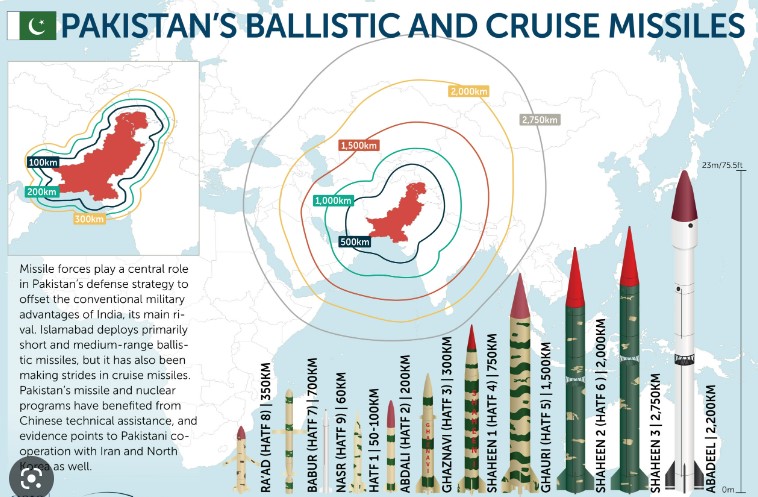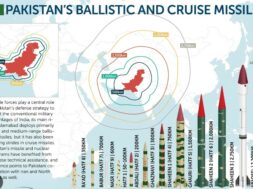
Roving Periscope: Even China dreads, as Pakistan is like a beggar armed with n-bombs, missiles!
Virendra Pandit
New Delhi: When India exploded its first nuclear device in May 1974 and joined the exclusive club of atomic powers, then Pakistan Prime Minister Zulfiqar Ali Bhutto famously announced: “We shall eat the grass but have our bomb.”
Nearly five decades later, as a bankrupt Pakistan has the “Islamic Bomb”, its poor people are close to eating grass as they have little to survive on.
In fact, Islamabad’s nuclear and long-range missile programs have become millstones around its own neck. Not only India, but Pakistan’s missiles also threaten the entire Middle East—including Shia Iran and Israel. Islamabad’s armament program threatens Russia, the Central Asian countries, and major parts of China, including the Xinjiang Province.
These facts have forced these wary countries to keep Pakistan in ‘good humor’ but gradually cut down on aid to an increasingly politically unstable, financially bankrupt, and unreliable country.
In other words, today’s Pakistan is like a beggar carrying a nuclear bomb! Recently, the UAE was reported to have banned ‘beggars’ from Pakistan’s 24 cities entering the Middle East on visitors’ visas.
Some of its militant leaders have publicly asked Islamabad to blackmail other countries with the nuclear threat to make them cough up aid.
Even its Prime Minister Shehzad Sharif, Defense Minister Khawaja Asif, and other leaders have admitted that Pakistan is like a beggar, bankrupt, and vulnerable. Some Pakistani leaders have openly asked Islamabad to use nuclear bombs to achieve its goals as they are not toys to be kept at home.
So, while the world is concerned about Pakistan’s slow descent into a civil war, Islamabad is scarcely concerned about food riots or political instability. For, it knows the powerful Army—the scared Pakistanis call it the Establishment, or Namaloom (Unknown)—is always there to take control and sort out “political nonsense.”
That is why, Pakistan is unlikely to back down from its armament program, come what may.
“Let me assure you that nobody will compromise anything on the nuclear or the missile program of Pakistan… Nobody has any right to tell Pakistan what range of missiles or nuclear weapons it can have. We must have our own deterrence…We represent the people of Pakistan…and we have to guard our national interests,” Finance Minister Ishaq Dar assured the National Assembly recently, responding to Opposition questions if the government would reduce its defense spending in general and its nuclear program in particular.
The Opposition asked this key question after widespread rumors across Pakistan that the International Monetary Fund (IMF) is set to ask Islamabad to cut down on its ballooning defense budget.
On its part, the IMF has officially denied these rumors: “There is absolutely no truth to this or any insinuated link between the past or current IMF supported program and decision by any Pakistani government over its nuclear program.”
But the inordinate delay in the IMF clearing the next tranche of USD 1.1 billion of a USD 7 billion loan already sanctioned in 2019 has aroused suspicions on this count, particularly when the global lender bailed out Sri Lanka and Ukraine last week.
Consider this: Pakistan is burdened with an external debt of over USD 130 billion. It has to pay USD 80 billion of this by 2026. It also needs USD 6 billion in new loans to bridge the financing gap, but neither Saudi Arabia nor the UAE or Qatar are listening to the fervent pleas of ‘brother’ Islamabad.
Even its ‘all-weather friend’ China is treading carefully while helping Pakistan. The Chinese banks have recently refinanced USD 1.2 billion in commercial loans and another USD 500 million in aid—meaning Islamabad is sinking only deeper and deeper into China’s ‘debt trap.’
That Pakistan has been blackmailing other countries with nuclear rhetoric is nothing new. Ever since the War on Terror started in 2001, the issue of the safety of Islamabad’s “Islamic Bomb” has been speculated upon as to whether it could fall into the terrorists’ hands.
According to reports, the West has actually ‘tamed’ Pakistan’s nuclear ambitions through technology and funding. Recently, United States Central Command’s chief General Michel Kurilla assured the US Senate about the safety of Pakistan’s nuclear apparatus.
In particular, the Arabs, Iranians, and Israelis are worried about an unpredictable Pakistan’s Shaheen-II long-range nuclear missile that can strike at a range of 2,750 km–covering not only most of India but also the Middle East. Reports suggested that some Pakistani politicians have been under pressure from the West regarding Pakistan’s capacity to hit Israel.
But Islamabad, and its well-entrenched Pakistan Army, ignore such concerns. For the Pakistani “Establishment,” missiles and nuclear weapons count much more than the welfare of citizens.
The reason is simple. The Army is the biggest beneficiary of Pakistan’s overall budget. Ironically, the Pakistan Army is also the most extensive business conglomerate in the country, employing nearly three million people on its payroll and having annual revenue of over USD 26.5 billion. Pakistan’s exact defense budget has always been unclear, as the National Assembly usually rubber-stamps whatever the Rawalpindi Establishment sends.
The Pakistani Army is into every conceivable business—ranging from making loaves, to poultry farming, real estate, banking, wind and solar energy, fertilizers and cement manufacturing, and more. For example, Askari Bank and Fauji Foundation generate over USD 10 billion of wealth annually. As the biggest real estate developers in Pakistan, they have over 50 housing projects coming up across the country, each spreading over several thousands of acres, the media reported.
They also own mines, commercial healthcare facilities, and a large network of schools and colleges across Pakistan.
So, while the army is part of the state in other countries, it is the other way around in Pakistan: An army that owns a state!














